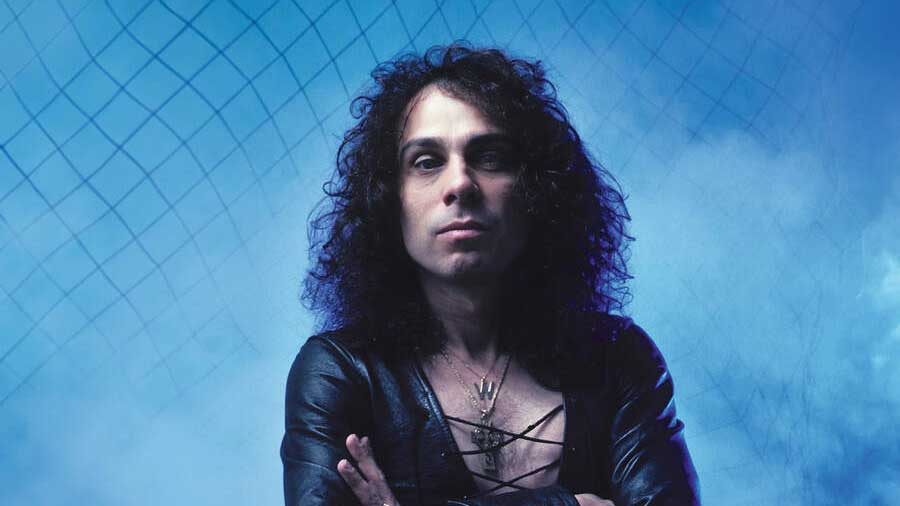
When 40-year-old Ronnie James Dio stormed out of Black Sabbath in 1982, finally defeated by the rampant drug abuse of guitarist Tony Iommi and bassist Geezer Butler, the world’s greatest heavy metal singer had an ace up his billowing wizard’s sleeve.
Ronnie had recently begun working on a new song, originally with Sabbath in mind, but by the time he finished it he wasn’t in Sabbath any more. Instead he recorded it with his new band – defiantly named Dio. Using his own name was a statement of personal and professional intent. Ronnie had co-created Rainbow with Ritchie Blackmore but remained essentially an employee in the band, as underlined when Blackmore fired him. He’d single-handedly resurrected Sabbath, gifting them the monumental Heaven And Hell album, but again came last in the pecking order when the shit went down.
The song was Holy Diver. And not only did it transform Ronnie’s life and career, it also helped define the sound of classic 80s metal. Instantly hailed as an all-time classic, Holy Diver was both rock anthem and personal mission statement.
He later claimed the lyrics were about a Christ-like figure from another world – a rock star, perhaps? – who sacrifices himself to save the people of another world when they throw him into the sea to prevent him leaving to save other people from other worlds.
But it’s not the letter of the lyric that really translates. It’s the more obvious message that comes through loud and clear in that marching-to-war rhythm as Dio unleashes a mighty roar: ‘Holy Diver! You’ve been down too long in the midnight sea!’
It was Dio talking to himself, willing himself back up from the underworld he had been left to die in by those he had once saved. Urging himself on to victory and revenge: ‘Like the eyes of a cat in the black and blue! Something is coming for you – look out!’
It also spoke of the tremendous new band he had put together to record the song, starting with Sabbath drummer Vinny Appice.
“I looked at him as a brother,” Appice says now. “I loved Tony and Geezer. They asked me to stay, but it was a different atmosphere and mood. It was just a lot easier to go with Ronnie and start something new.”
The two spent the next few weeks jamming in a small wooden shack at the back of Dio’s house. Dio cast around for a guitarist. LA then was full of six-string heroes, and almost all of them auditioned. Most outstanding was 25-year old Jake E Lee, who after being rejected by Dio would join Ozzy Osbourne’s band.
“He was a great guitar player,” Appice recalls. “But Ronnie wanted to make the band more international, not just another American band.”
Dio’s wife and manager, Wendy Dio, points to the fact that both Rainbow and Sabbath were British bands with American members. “He liked the way British musicians thought more than the flashy American kind. It was more melodic.”
He also loved British humour – Fawlty Towers was his favourite show – and he had a taste for strong English ale and Indian curry houses. “It was like he’d been a Brit in a previous life.”
Returning with Appice from a headhunting trip to London, they were joined by former Rainbow bassist Jimmy Bain, and a 20-year-old unknown hotshot guitarist from Northern Ireland named Vivian Campbell. Bain, then coming up to his 35th birthday, was a hard-living Scotsman. Appice recalls their first rehearsal: “Jimmy’s laying down on the stage, playing. I said: ‘Ronnie, is he okay?’ He said: ‘Don’t worry about it. That’s just the way he is.’”
By contrast, Campbell still had stars in his eyes: “I was a big Rainbow fan. To me, Dio was a big star and it was weird just being in the same room as him.”
Working at the Sound City duplex in Van Nuys, the first song they worked on was Holy Diver, followed by the other eight tracks that would complete the debut Dio (the band) album, also titled Holy Diver.
“We were smoking a lot of pot, friends would come down,” Campbell recalls. “It was a great atmosphere.”
The accusation later on that Holy Diver had been unduly ‘inspired’ by Survivor’s Eye of The Tiger, a huge summer hit in 1982, was dismissed out of hand in Ronnie’s posthumous autobiography Rainbow in The Dark, in which he wrote: “That anthemic marching beat has been the backbone of many a monumental musical moment. It’s not the size, it’s what you do with it. Survivor had a huge pop hit. I had a new heavy metal classic for the ages.”
For Ronnie, the track Holy Diver “was one of the proudest things I’ve ever done,” he told me years later. “Rock but not just noise. Great song, great playing.” And some great singing too.
“To my ears it was a classic-sounding record,” says Campbell. “A lot of things were changing in rock, bands like Ratt and Dokken. But Ronnie wanted a very classic-sounding record and he was very, very adamant about that.”
The first single from the album, Holy Diver heralded the arrival of an album now acclaimed as one of three all-time classics the singer would helm. But where the first two – Rainbow’s Rising and Sabbath’s Heaven And Hell – had made Ronnie the most celebrated career rejuvenator in rock, Holy Diver heralded a new career vista for him.
Ronnie’s aim, he told me just before he died in 2010, was “to finally do things the way I wanted to, without compromise”. One listen to the blood-oath battle cry of Holy Diver and you’d have to conclude that he succeeded in doing just that.







